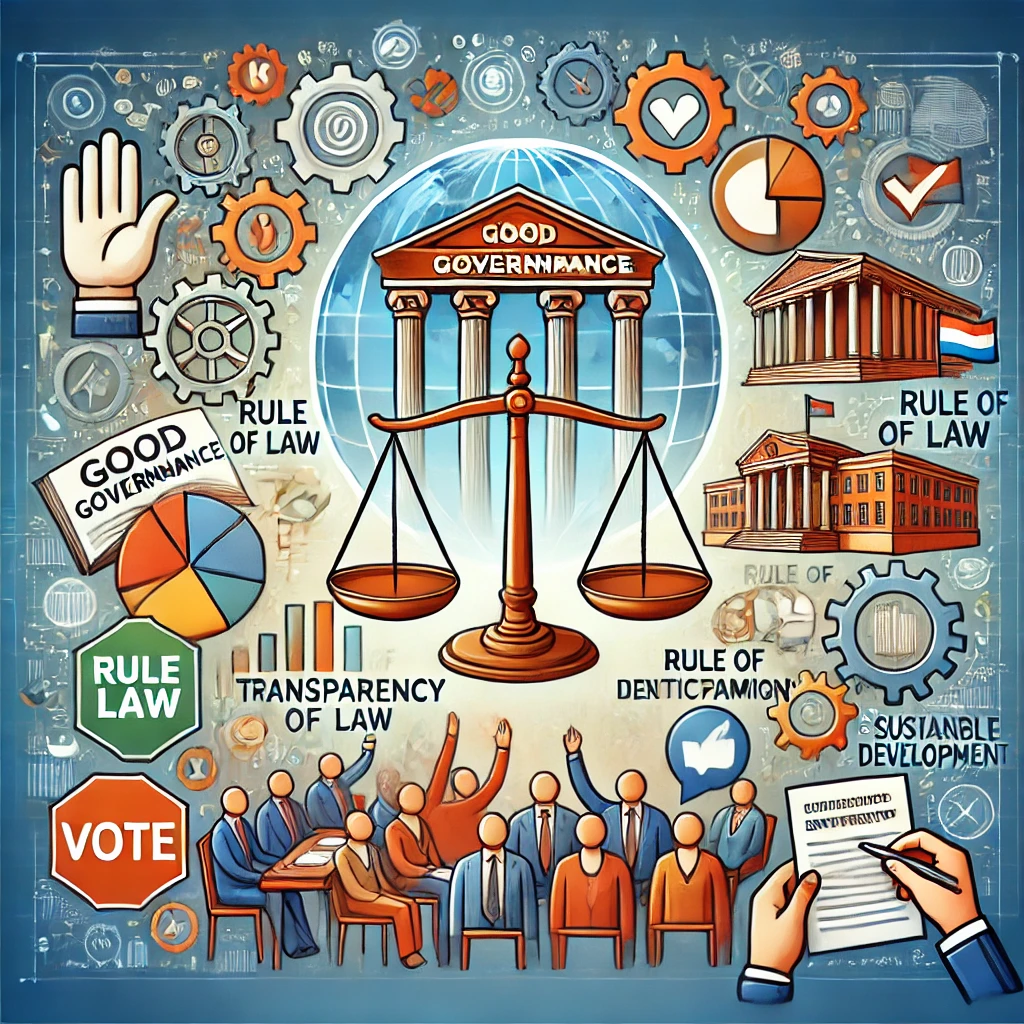Good governance is the backbone of a societal setup. It ensures that governments take decisions and formulate policies that benefit people at large. Good governance ensures the presence of fairness, transparency, and accountability in the governance system of any country. Development and peace require this concept.
- Governments have to work for efficiency and effectiveness in every sector.
- Citizens should participate in decision-making for better results.
- Transparency and Rule of Law are considered the back-bone of any thriving society.
- Corruption should be reduced and minimized for the fortification of public trust
- Equality in enforcement of law and resource allocation is a must.
| GS Paper | GS Paper I, GS Paper III |
| Topics for UPSC Prelims | Governance initiatives, Role of NGOs, SHGs, and informal associations, Economic policies of the government, Fiscal policy, public distribution system, Social sector initiatives |
| Topics for UPSC Mains | Inclusive growth and development, Government budgeting and transparency, Economic reforms for poverty alleviation |
Characteristics of Good Governance
Characteristics of good governance include transparency, accountability, participation, and the rule of law. All these elements contribute to the development of a just-decision-making environment with sound management and suitable access to sources. These, together, make them feel secure and thrive in the society.
Participation
Citizen engagement plays a crucial role in decision-making. It may be direct or through constitutional institutions that express the interest of people. This, therefore, allows citizens to express their views as this develops policies and ensures that everything the government does is as close to the needs and welfare of society as possible. Inclusive governance empowers diversified opinions, therefore, making decisions balanced and actualized.
Rule of Law
Rule of Law would ensure no misuse of power, and laws must be applied uniformly to protect human rights and ensure justice. Balanced legal systems and independent law enforcement are crucial elements. Once all walks of life come under the arms of the law, it will strengthen public confidence and nurture an organized and peaceful society.
Transparency
Public trust is earned when the government operates and decides openly. Transparency is a response to providing citizens with relevant, correct, and well-timed information to enable them to know policies and actions. It discourages corruption as citizens will make transparent critiques of government activities, and therefore, they must be within legal and ethical standards.
Responsiveness
For good governance to be effective, there must be timely and relevant responses towards the needs and concerns of the citizens. Public service delivery, therefore ought to, be efficient in addressing societal demands and challenges. Responsiveness enables governments to develop quality of life enhancing responses towards changing circumstances that improve trust and reliability among citizens.
Equity and Inclusiveness
A central requirement is that all members of society have fair access to resources and opportunities. No group should be neglected or excluded. Governing, an inclusive form has in its view the needs of the most vulnerable and disadvantaged communities. With regard to equal participation and benefit, disparities are reduced, and the effect is social cohesion.
Accountability
Accountability would hold the government officials and institutions accountable for their performance and decisions. That said, the respective places with clear responsibilities and standards can ensure oversight and performance evaluation. If accountability is in place, officials are less likely to succumb to corruption or abuse of their own powers with improper allocation of public services for welfare matters.
Effectiveness and Efficiency
The use of resources, maximum benefit with minimum waste, helps to characterize good governance. Efficiency leads to a wanted outcome through good policies and processes while effectiveness ensures that public services are delivered in time at the lowest cost feasible. Such an approach creates sustainable development and enhances quality life for the citizenry.
Consensus Oriented
A good governance approach involved considering various viewpoints and interests, thereby building broad-based consensus on the policies. It stresses the collaborative and dialogue approach between the government, civil society, and the private sector to work out solutions. Consensus-oriented governance seeks common grounds in their approaches in the search for balanced, long-term, and inclusive solutions that benefit society as a whole.

Principles of Good Governance
In good governance, there are transparency, accountability, participation, and the rule of law. The elements above will ensure governments make fair, effective, and inclusive decisions in governance to build public trust, minimize instances of corruption, and ensure policies serve the welfare of all citizens.
Transparency
The key aspect is transparency, which involves open communication and free flow of information. This means citizens have access to government activities, decisions, and policies. Openness ensures public confidence because it allows citizens to see how decisions are made and the process of holding those officials accountable. Accountability also discourages fraud and corruption since no government can work under cover and obscurity.
Accountability
It means that officials, institutions in government, and private sectors are responsible for their actions. They are accountable for the consequences of their policies and decisions. Well-defined standards and procedures for performance evaluation result in ethical practice. When leaders are accountable, public resources are used efficiently, and citizens can trust their government to serve their interests.
Participation
Participation lets citizens have a voice in decision-making. It involves people either directly or through representative bodies in policy decisions that affect them. They are more balanced and fair in solutions. It empowers citizens, strengthens democracy, and makes governance responsive to the diverse needs of society.
Rule of Law
The rule of law shall ensure that the same laws were placed equitably and uniformly before everybody. It safeguards man’s rights, limits the powers of authorities, and delivers justice. Efficient legal and fair administration are sine qua non. Security and stability in maintaining the rule of law make society more just.
Effectiveness and Efficiency
Governance should accomplish results that are responsive to societal needs and utilize available resources optimally. Some effective policies include effectiveness, ensuring that their aims are realized, while efficiency ensures services offered by the public service are delivered on time and in an economical way. It ensures sustained development without waste and maximizes citizen benefits; it also creates trust within government structures.
Equity and Inclusiveness
Proper governance affords everyone regardless of origin equal opportunities and equal access to resources. Good governance cares for society’s most vulnerable as a form of social justice. Equity tries to reduce inequality by applying diversity that is a part of it in all the decision making which invites a group to feel belonging and equity.
Consensus Oriented
As much as possible, governance should achieve broad consensus in the society to overcome conflicting interests. Provision of ample space for and promotion of dialogue among views between governments can work towards making policies based on common grounds. This principle results in cooperation, stability, and long-term solutions. Policies would be balanced, inclusive, and generally acceptable to all stakeholders with consensus-oriented decision-making.

Characteristics of Good Governance
These include transparency, accountability, participation, and the rule of law. Such characteristics ensure that decisions made are fair to all and that one uses resources in a way that is neither biased nor unequal. They are welcoming of trust and inclusiveness, hence building a society where every citizen’s well-being will be of the utmost priority.
Transparency
Transparency would mean open communication and access to information. In this respect, governments should provide citizenry with timely and accurate data available on policies and decisions. Openness would provide room for public scrutiny of actions undertaken by the governments to pinpoint corruption and ensures trueness between the governmental administration and society at large. It would assure acting in the best interest of the public and raising accountability.
Accountability
Accountability ensures that there is responsibility from government institutions and officials regarding the actions they undertake. Definition of roles and responsibilities should, therefore, take place to understand performance. It discourages leaders from using their authoritative position to abuse, boosts integrity, ensures that public resources are consumed optimally for the greater good, which tends to move confidence from the people into governance.
Participation
Participation Involves citizens in the process of making decisions either directly or through legally established organs Participation of citizens at all levels of decision-making most of the time lead to good and just governance since the people will have a say in what is decided. This promotes the consideration of various opinions in decisions related to community benefit activities, which ensures that government undertakings address the needs and interests of society.
Rule of Law
The rule of law principle will promote the guarantee of people’s issues, such as the government, and everyone present is protected by laws that are applied upon everyone fairly and justly. This will reduce arbitrary decisions, protect human rights, and lead to a just society. Strong legal frameworks and fair means of law enforcement can help produce order and win public confidence.
Equity and Inclusiveness
Equity ensures all citizens have a chance of using the resources given. Inclusiveness demands that the needs of other various marginalized and vulnerable groups are met. Good governance reduces societal disparities created in a society since it creates an environment in which everyone feels valued as well as represented. Such a society shares prosperity.
Effectiveness Efficiency
Effectiveness ensures that policies and services meet the societal needs while achieving the intended outcomes. Efficiency refers to the management of available resources in the best possible manner to avoid any form of wastage. Effective and efficient governance enhances welfare as far as the public is concerned, which will promote sustainable development and improve the quality of life of all citizens.
Consensus-Oriented
Governance consensus-oriented addresses diverse views and interests, leaning towards common ground policies to be accepted by society. There results a well-balanced decision through dialogue and collaboration of stakeholders in ensuring the best interest of society in general. This characteristic builds trust, reduces actual conflicts, and is a long-term solution aligned with community goals and values.
Responsiveness
Institutional and procedural responsiveness is responsiveness by institutions and procedures to meet the needs of the public within a reasonable timeframe. Responsive government listens to the needs of the citizens concerning any concern they may have and allows room for the amendment of policies to benefit the citizens. In this regard, proactive and adaptive governments can effectively manage problems and build public trust towards citizens’ general welfare.
Dimensions of Good Governance
The principles of good governance are transparency, accountability, participation, and the rule of law, equity, and responsiveness. These ensure that the government effectively, justly, and inclusively fulfills the public’s needs. Good governance stimulates openness, equitable resource utilization, and active citizen participation to establish a culture of trust; therefore, there will always be reduced corruption and sustainable development.
- Transparency: Governments operate openly to bring in confidence.
- Accountability: ‘Clear duties and consequences for failing to abide by established rules’.
- Participation: Everyone, in society, is involved in policy and decision-making processes.
- Inclusiveness: Equal access to resources for every segment in the society.
- Rule of Law: Equal laws being equally applied and differentiated neither in their development nor in their enforcement.
Conclusion
Good governance is the backbone for making any society better and developed. The practice of good governance brings into existence an accountable and transparent society. Results emanating from good governance practices lead to sustainable development because citizens are made to feel secure and valued.
| Good Governance UPSC Notes |
| 1. Good governance ensures the effective and efficient management of public resources for the benefit of society. 2. It emphasizes transparency and accountability in government actions, promoting trust among citizens. 3. Key elements of good governance include rule of law, participation, responsiveness, and equity. 4. It fosters an inclusive approach, ensuring the involvement of diverse groups in decision-making processes. 5. Good governance addresses corruption by establishing strong legal frameworks and ethical standards. 6. It ensures sustainable development by considering environmental, economic, and social aspects in policies. 7. Effective governance strengthens institutions, ensuring the protection of rights and welfare of citizens. 8. It promotes a responsive administration that addresses public needs and adapts to changing circumstances. |


